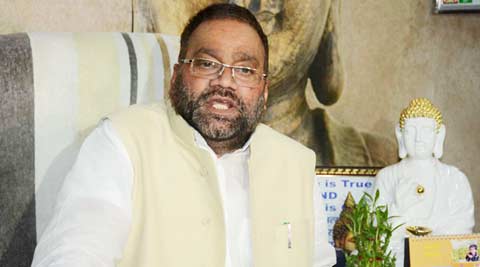Opinion Swami Prasad Maurya: Asset to BJP, especially in SP strongholds
Swami Prasad Maurya is an asset to the BJP which appears to be struggling to woo Dalits, about 21 per cent of state's population, most of whom are openly leaning towards Mayawati.

 Former BSP general secretary Swami Prasad Maurya
Former BSP general secretary Swami Prasad Maurya
Former BSP general secretary Swami Prasad Maurya’s entry into the BJP on Monday comes as an apparent boost to the saffron group’s attempts to reach out to backward castes, which form nearly half of Uttar Pradesh’s population and are capable of swaying the result of coming assembly elections.
More specifically, Maurya who enjoys support in his own Maurya-Kushwaha caste, also known by Shakya and Saini surnames in west UP, will not only solidify the party’s hold on the caste group, but also strengthen the BJP’s presence among the non-Yadav backward castes, whom BJP is trying hard to take into its fold.
Kushwaha-Maurya is one of the largest backward caste in UP, the other being Yadav, Kurmi and Lodh. As Yadavs are seen as dedicated Samajwadi Party supporters, the BJP is also trying to woo Kurmis, the latest apparent attempt is induction of Apna Dal MP Anupriya Patel as a union minister of state. The party already has a large number of leaders including former chief minister Kalyan Singh and Union Minister Uma Bharti from Lodh caste.
The arrival of Maurya is not just likely to fetch the BJP support from his caste group, especially in the party’s weak zones like SP strongholds of Etawah, Etah, Mainpuri, Kannauj, but will also pave way for wooing sections disgruntled with Mayawati. Maurya, who practices Buddhism and has been a leader of BSP for two decades, could also be used by the BJP to change its perception among sections of Dalits and backward castes.
Though the BJP clearly stands to gain with Maurya’s arrival, the party will also have to deal with some frictions that are likely to arise with the entry of former BSP leader. Maurya’s entry may lead to a power-tussle between him and Phulpur MP Keshav Prasad Maurya, whom BJP appointed earlier this year as state president to reach out to the same Kushwaha-Maurya caste group. Maurya who first became an MLA in 1996, has publicly said that Keshav, who first became an MLA in 2012, is little-known in his community. However, Keshav welcomed Maurya at his joining in Delhi on Monday.
When Maurya left the BSP on June 22 accusing Mayawati of “auctioning” party’s tickets for elections, Mayawati hit back saying he had left the party because she had denied tickets to his son and daughter. She accused him of promoting nepotism.
Watch Video: What’s making news
Maurya’s son Utkrisht who had unsuccessfully contested 2012 assembly election from Unchahar seat of Rae Bareli, and daughter Sanghmitra, who unsuccessfully contested 2012 assembly election from Aliganj seat of Etah district and 2014 Lok Sabha election against SP chief Mulayam Singh Yadav from Mainpuri, are both claimants for tickets. It goes without saying that Maurya would want both of them to be accommodated by BJP, which could leave the BJP facing allegations of promoting nepotism and giving importance to “outsiders” at the cost of its own cadres.
Previously Maurya has conducted himself as a crusader against the Hindu caste system and Brahminism. A few of his supporters have said that they will adjust to the BJP’s culture because their ideological home, BSP, has lost its path.
However, his supporters take comfort in the appointment of Narendra Modi, from a backward caste, as Prime Minister, saying it shows the changing culture of the BJP which was earlier seen as an upper caste party. Also the BJP should not have problems in accommodating Maurya’s supporters who have their bases in areas where BJP has been struggling in last few assembly elections.
Overall, Maurya comes as an asset to the BJP which appears to be struggling to woo Dalits, about 21 per cent of state’s population, most of whom are openly leaning towards Mayawati. And to put up a good fight in the elections, BJP needs to strongly pursue the support of Hindu castes among Other Backward Classes, about 45 per cent of the state’s population.
Kushwaha-Maurya caste which had largely supported BSP until a few years back, appears inclined towards BJP, an apparent reason for Maurya to make his decision. The caste group largely supported the BJP during Ram temple movement and also in last Lok Sabha polls. Most of Maurya’s supporters, whose opinions he had sought in writing at his July 1 workers’ meet in Lucknow, had urged him to join the BJP. Others had asked him to launch his own party, a suggestion, he has preferred to ignore, largely because he also needs an established party to survive in politics and not end up in oblivion like most of the former BSP leaders.





